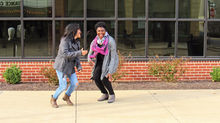Me Too.
- Oct 17, 2017
- 3 min read

I'm also not a huge fan of hashtags whenever there's a tragedy. We become desensitised to what's going on around us. We diminish someone's life-changing loss from monumental sadness to a catchy tweet (#PrayForVegas, #SayHerName, #TakeAKnee, etc) when we could be dedicated this time and energy to donating for the families in need, contacting our local legislators to make a change, etc. There's a lot that we could do to push and make our society grow and heal, but instead, we sit on our computers, move our fingers and basically create something "trendy." That's simply not enough.
#MeToo is different. When this all first started, I was not surprised necessarily by how many women were sharing their stories, but by how many of them I knew. For a lack of words it was sad, and it almost made me angry. Women shouldn't have to spill their guts, their deepest horrors for us to believe that this is real. So many women spilling their deepest horror stories shouldn't be what it takes for us to believe that this is real, either. If someone runs to us crying and says, "I was mugged," we call 911 before they've even finished talking. But when someone comes crying to us saying, "I was sexually assaulted," we want a full-on interview, video evidence, physical evidence on clothing, and then we still don't believe it.
But, at the same time, there's something different about #MeToo--mostly because there's something different about sexual harassment and assault. It's no regular crime. Victims are treated as a liar, and are "guilty until proven innocent," even though 1 in 6 American women and 1 in 33 men will face this in their lifetime. You're shamed into thinking it's your fault because you didn't learn martial arts, carry a gun or another form of weapon, wear special underwear when you leave the house and watch what's in your drink on Saturday nights even thought 55% of assaults take place in the victim's home and 70% of assaults are committed by victim the person knows. Even though 70% of rape or sexual assault victims experience moderate to severe distress--a larger percentage than for any other violent crime--2/3 of assaults go unreported, and 99% of perpetrators walk free. Most women do not report because they fear retaliation, or do not believe the police will help them.
In all honesty, most, if not all hashtags do nothing but give us something to look at as we're scrolling down our Twitter feeds. They do next to nothing. But this hashtag, #MeToo, is the starting point for many survivors. For some, it is the first time they've ever spoken out about their trauma. It may be their first chance at getting support, should any caring followers reach out and offer their help. It could be the difference between moving towards healing, or turning towards suicide (33% of women assaulted contemplate suicide, and 13% attempt it). It shouldn't take a trend for us to take this seriously, nor should that be where we stop. We can do more than just talk about it; more than just lift up our heads from the sand. We can donate, educate, advocate—and if nothing else, believe what victims say when they come forward.
A month from now, if all we’ve done is watch women tell their gruesome stories, alongside a popular 5 letter phrase, what’s the point?
All statistics found at rainn.org
“I wish women didn’t have to rip our pasts open and show you everything and let you ogle our pain for you to believe us.” — Lindy West
Love and light,
Reina M






































Comments